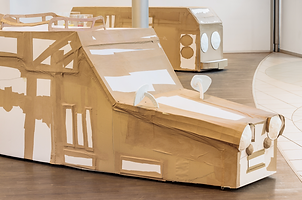
GASH STATION
Chevy in the Hole
At this point, everything interesting has been written about the car. It's the weird phone booth to drive around in public space, the glass box that plows through the landscape. Even though we've realized that the private automobile and the cities designed around them is suicidal on a global scale, we still fetishize them.
As a kid growing up in Michigan, cars were a kid-friendly diagram of how the region viewed foreign policy. A carry over from WWII, cars were a stand-in for the 'other'. German cars were 'good' foreign cars, frowned upon for being emblematic of Nazis, but still a status symbol because they were more expensive. Japanese cars were infantilized, called toys, and were affordable and fuel efficient enough to pose a threat. Korean cars hadn't entered the American market yet. Michigan was the home of American car manufacturing, its regional identity shaped almost exclusively by an industry who refused to love it back.
Buick City.
When my family moved to a suburb of Flint in the late 1980s, the auto industry had already begun pulling out. Factories were being razed to the ground and moved, labor became more automated and outsourced. Since the late 1970s, Flint 'Buick City' has lost nearly half of its population and more than 70,000 jobs in the car industry. Basic services have been cut off to portions of the city, its water was discovered as poisonous in 2014, but other than that the city’s on an upswing.
Symbolizing the plight and frustration of the city, there was a stigma attached to foreign made cars when I was young. In parking lots people would scratch them with keys, intentionally smack them with their doors, use racial slurs to describe them. Due to this, sometimes you’d see foreign cars parked deep in a lot, isolated and safe from the hatred of the locals. Car theater, sublimely choreographed to communicate the hopelessness of a fading era.
My family didn't have a foreign car until the late 90s when Bunz (my dad) bought a German model. Beyond labor concerns, it was also still considered a bit unkosher for a Jew to drive a German car. You could see this in the parking lot of our Synagogue. Last time we visited Flint this wasn't the case anymore though. Cars had stopped being stand-ins for a foreign 'other', and are more like appliances now, emptied out of their geographically local ideologies.
Back to the Bricks.
That same trip, we went to the annual car show to watch a parade of tricked out muscle cars, pragmatic sedans, and old-timers drive down an 11km (7mile) stretch of Saginaw Road. Spectators lined the shoulder of the road, sat in various parking lots or leftover strips of grass to witness a piece of American history drive by. My partner Claus said it was really weird that people drive, park their cars, get out lawn furniture and coolers, then sit in front of their cars to watch other cars. I remember talking to her about how invested and inspired by the aesthetics people seemed. They would honk, cheer, and clap for certain cars. These machines are the local artistic language, and most grew up being trained to ‘look’ and learn about their cultural and symbolic value.
That afternoon, people parked their pragmatic and eco-conscious appliances to look at old master works. Just like objects in a museum, these rarefied show pieces had been pulled out of storage, placed into curatorial categories, and taken for a short ride down the gallery of the street. While watching this, I realized that the car as an expression of political identity was over. The era of industrial art that was excessive, highly expressive, and dominated space unapologetically had passed. The tragedy of the situation was that most of these artifacts had at least been partially made in the area and accelerated an already dire environmental crisis. They were built on stolen land and borrowed time. And we all went there to admire them.
Seth Weiner
“Charlotte Gash is an artist and she doesn’t have a car. She has many. And she’s selling them… The Neuer Kunstverein Wien (NKW) and Salvatore Viviano (Where Are My Keys? Art Projects) are very happy to invite you to the opening of Gash Station. Opening on March 23, Gash Station will present a slick selection of brand new car models. You will find the perfect one for any occasion, the car that will provide a comfortable ride for every journey. Gash Station, powerful engines, smooth experiences.”
Salvatore Viviano





photos by Christine Dahlerup


















photos by Manuel Carreon Lopez, Kunst-Dokumentation.com
